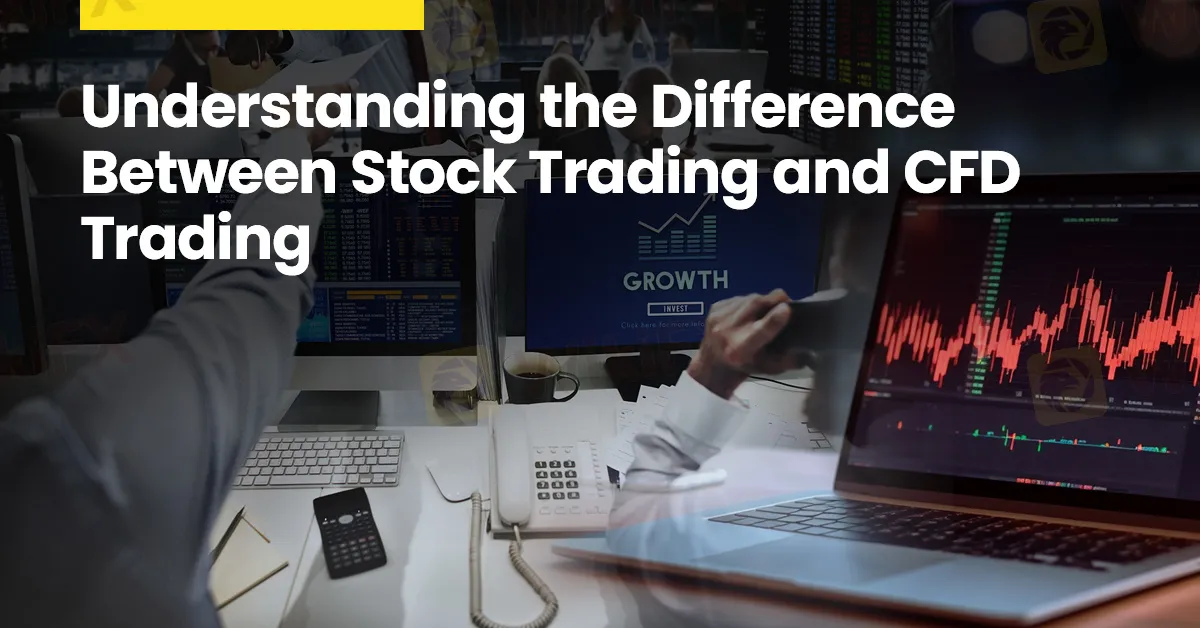简体中文
繁體中文
English
Pусский
日本語
ภาษาไทย
Tiếng Việt
Bahasa Indonesia
Español
हिन्दी
Filippiiniläinen
Français
Deutsch
Português
Türkçe
한국어
العربية
Understanding the Difference Between Stock Trading and CFD Trading
Abstract:In the dynamic world of online trading, two popular methods have emerged as favourites among traders: stock trading and trading Contracts for Difference (CFDs). This article will explain the differences between these two trading methods thoroughly.

In the dynamic world of online trading, two popular methods have emerged as favourites among traders: stock trading and trading Contracts for Difference (CFDs). While both offer opportunities to profit from market movements, they differ significantly in mechanics, risks, and potential rewards. Understanding these differences is crucial for any trader looking to navigate the financial markets effectively.

Stock trading involves buying and selling shares of publicly listed companies. When you purchase a stock, you own a portion of the company, entitling you to a share of its profits and voting rights at shareholder meetings. For instance, if you buy shares of Apple Inc., you become a partial owner of the tech giant and can benefit from its growth and dividends.
Stock trading offers several advantages, including ownership and dividends, as owning stocks means holding a stake in a company, with many companies paying dividends that provide a steady income stream. It also offers long-term growth potential, as stocks can appreciate significantly over time, and benefits from regulation and transparency, ensuring a high degree of investor protection. However, stock trading also has its drawbacks: it requires substantial capital, especially for high-priced shares, is limited to market hours which can restrict trading flexibility, and realizing significant returns can take a long time, depending on market and economic conditions.

CFDs, or Contracts for Difference, allow traders to speculate on the price movements of various financial instruments without owning the underlying asset. A CFD is a derivative product where you agree to exchange the difference in the asset's price from the moment you open the contract to when you close it. For example, if you believe Teslas stock price will rise, you can buy a CFD on Tesla shares. If the price goes up, you profit from the difference; if it falls, you incur a loss.
CFD trading offers several advantages, including leverage, which allows traders to control a large position with a relatively small amount of capital, thereby amplifying potential returns. It also provides market access, enabling traders to access a wide range of markets, including stocks, commodities, forex, and indices, from a single platform, and flexibility, as CFDs can be traded around the clock, offering greater flexibility compared to traditional stock markets. However, CFD trading also has its drawbacks: it involves high risk, as leverage can amplify losses and traders can lose more than their initial investment, there is no ownership of the underlying asset, meaning traders do not benefit from dividends or ownership rights, and it often comes with higher fees and spreads, which can eat into profits.

Imagine you have $1,000 to invest. In stock trading, you decide to buy shares of Microsoft at $250 per share. You can buy four shares. If Microsofts stock price increases by 10% to $275, your investment is now worth $1,100, giving you a $100 profit.
In contrast, with CFD trading, you could use leverage (e.g., 10:1) to control a $10,000 position in Microsoft with your $1,000. If Microsofts stock price rises by 10%, the value of your position increases to $11,000, netting you a $1,000 profit. However, if the price drops by 10%, you lose $1,000, potentially wiping out your entire investment.
In summary, both stock trading and CFD trading offer unique advantages and risks. Stock trading is ideal for those seeking ownership and long-term growth, while CFD trading appeals to those looking for flexibility and the potential for higher returns through leverage. Understanding these differences and carefully considering your risk tolerance and investment goals is essential to making informed trading decisions in todays financial markets.

Disclaimer:
The views in this article only represent the author's personal views, and do not constitute investment advice on this platform. This platform does not guarantee the accuracy, completeness and timeliness of the information in the article, and will not be liable for any loss caused by the use of or reliance on the information in the article.
Read more

Geopolitical Events: What They Are & Their Impact?
You've heard many times that geopolitical events have a significant impact on the Forex market. But do you know what geopolitical events are and how they affect the FX market? Let us learn about it today.

Why Do You Feel Scared During Trade Execution?
Trade execution is a pivotal moment for traders. It is when analysis turns into action, and potential profits or losses become reality. However, for many traders, this moment is accompanied by fear. Why does this happen, and how can you address it?

WikiEXPO Global Expert Interview: Simone Martin—— Exploring Financial Regulation Change
In the midst of financial innovation and regulation, WikiGlobal, the organizer of WikiEXPO, stays abreast of industry trends and conducts a series of insightful and distinctive interviews on pivotal topics. We are delighted to have the privilege of inviting Simone Martin for an in-depth conversation this time.

CySEC Settles Compliance Case with Fxview Operator Charlgate Ltd
Discover how CySEC resolved compliance issues with Charlgate Ltd, the operator of Fxview, through a €50,000 settlement. Explore the investigation, regulatory measures, and CySEC's new website designed for improved accessibility and transparency.
WikiFX Broker
Latest News
CFI Partners with MI Cape Town, Cricket Team
Doo Financial Expands Reach with Indonesian Regulatory Licenses
Volkswagen agrees deal to avoid Germany plant closures
Geopolitical Events: What They Are & Their Impact?
Webull Canada Expands Options Trading to TFSAs and RRSPs
CySEC Launches Redesigned Website Packed with New Features
WikiEXPO Global Expert Interview: Simone Martin—— Exploring Financial Regulation Change
TradingView Launches Liquidity Analysis Tool DEX Screener
MultiBank Group Wins Big at Traders Fair Hong Kong 2024
WikiFX Review: Is PU Prime a decent broker?
Currency Calculator


